- Clone
- 8WG16 (See other available formats)
- Regulatory Status
- RUO
- Other Names
- RNA polymerase II sub-unit 1, RPB1, CTD repeat YSPTSPS, C- terminal domain repeat YSPTSPS, DNA-directed RNA polymerase II subunit A, RNA-directed RNA polymerase II subunit RPB1, POLR2A, POLR2
- Isotype
- Mouse IgG2a
- Ave. Rating
- Submit a Review
- Product Citations
- publications
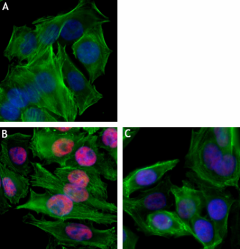
-

HeLa cells were fixed with 4% paraformaldehyde (PFA) for 10 minutes, permeabilized with 0.5% Triton X-100 for 3 minutes, and blocked with 5% FBS for 60 minutes. Then the cells were intracellularly stained overnight at 4 degrees with (A) 1: 250 diluted (2 µg/ml) Alexa Fluor® 647 Mouse IgG2a (Cat. No. 400234)or with Alexa Fluor® 647 anti-RNA Polymerase II RPB1 (red) at (B) 1: 250 (2 µg/ml) and (C) 1: 1000 (0.5 µg/ml) dilution. Nuclei were counterstained with DAPI (blue). Actin filaments were labeled with Flash Phalloidin™ Green 488 (green, Cat. No. 424201). The image was captured with a 60X objective.
| Cat # | Size | Price | Quantity Check Availability | Save | ||
|---|---|---|---|---|---|---|
| 664913 | 25 µg | 128€ | ||||
| 664914 | 100 µg | 324€ | ||||
RPB1 is the catalytic and largest component of RNA polymerase II, which synthesizes mRNA precursors and many functional non-coding RNAs. It forms the polymerase active center together with RPB2, the second largest subunit. Polymerase II (Pol II) is the central component of the basal RNA polymerase II transcription machinery. It is composed of mobile elements that move relatively to each other. RPB1 is part of the core element with the central large cleft, the clamp element that moves to open and close the cleft, and the jaws that are thought to grab the incoming DNA template. At the start of transcription, a single DNA template strand of the promoter is positioned within the central active site cleft of Pol II. Then, a bridging helix emanates from RPB1 and crosses the cleft near the catalytic site, which acts as a ratchet that moves the RNA-DNA hybrid through the active site by switching from straight to bent conformations during each neuocleotide addition. This promotes translocation of Pol II. Pol II moves on the template during transcription elongation. Elongation is influenced by the phosphorylation status of the C-terminal domain (CTD) of Pol II's largest subunit (RPB1), which serves as a platform for assembling factors that regulate transcription initiation, elongation, termination, and mRNA processing. It can act as a RNA-dependent RNA polymerase when associated with small delta antigen of Hepatitis delta virus, being able to conform as both a replicate and transcriptase for the viral RNA circular genome.
Product DetailsProduct Details
- Verified Reactivity
- Human, Mouse
- Reported Reactivity
- Other species
- Antibody Type
- Monoclonal
- Host Species
- Mouse
- Immunogen
- Wheat germ RNA Polymerase II
- Formulation
- Phosphate-buffered solution, pH 7.2, containing 0.09% sodium azide.
- Preparation
- The antibody was purified by affinity chromatography and conjugated with Alexa Fluor® 647 under optimal conditions.
- Concentration
- 0.5 mg/ml
- Storage & Handling
- The antibody solution should be stored undiluted between 2°C and 8°C, and protected from prolonged exposure to light. Do not freeze.
- Application
-
ICC - Quality tested
- Recommended Usage
-
Each lot of this antibody is quality control tested by immunocytochemistry. For immunocytochemistry, a concentration range of 0.5 - 2.0 μg/ml (1:250 - 1:1000 dilution) is recommended. It is recommended that the reagent be titrated for optimal performance for each application.
* Alexa Fluor® 647 has a maximum emission of 668 nm when it is excited at 633 nm / 635 nm.
Alexa Fluor® and Pacific Blue™ are trademarks of Life Technologies Corporation.
View full statement regarding label licenses - Excitation Laser
-
Red Laser (633 nm)
- Application Notes
-
Clone 8WG16 recognizes YSPTSPS in the C-terminal domain. The antibody cross-reacts with wheat, yeast, mouse, c. elegans, x. laevis, and most eukaryotic RNAPII.
Additional reported applications (for the relevant formats) include: chromatin immunoprecipitation, functional assay, and immunoprecipatation. - Application References
-
- Edwards AM, et al. 1990. Proc. Natl. Acad. Sci. USA. 87:2122.
- Thompson NE, et al. 1990. J. Biol. Chem. 265:7069.
- Thompson NE, et al. 1989. J. Biol. Chem. 264:11511.
- RRID
-
AB_2728497 (BioLegend Cat. No. 664913)
AB_2728497 (BioLegend Cat. No. 664914)
Antigen Details
- Structure
- RPB1 is a 220 kD subunit of RNA polymerase II and has 1970 amino acids.
- Distribution
-
Nucleus; ubiquitous expressed in all cells
- Function
- Core element of RNA polymerase II transcription machinery.
- Interaction
- COMPASS (COMplex of Proteins ASsociated with Set1), SET2, BRE1
- Biology Area
- Cell Biology, Transcription Factors
- Molecular Family
- Nuclear Markers
- Antigen References
-
- Chávez S, et al. 2016. CUrr. Genet. 62:701.
- Gene ID
- 5430 View all products for this Gene ID 20020 View all products for this Gene ID 2540292 View all products for this Gene ID
- UniProt
- View information about RNA Polymerase II RPB1 on UniProt.org
Related Pages & Pathways
Pages
Related FAQs
Other Formats
View All RNA Polymerase II RPB1 Reagents Request Custom Conjugation| Description | Clone | Applications |
|---|---|---|
| Purified anti-RNA Polymerase II RPB1 | 8WG16 | WB,ICC,ChIP,FA,IP |
| Alexa Fluor® 594 anti-RNA Polymerase II RPB1 | 8WG16 | ICC |
| Alexa Fluor® 647 anti-RNA Polymerase II RPB1 | 8WG16 | ICC |
| Alexa Fluor® 488 anti-RNA Polymerase II RPB1 | 8WG16 | ICC |
Compare Data Across All Formats
This data display is provided for general comparisons between formats.
Your actual data may vary due to variations in samples, target cells, instruments and their settings, staining conditions, and other factors.
If you need assistance with selecting the best format contact our expert technical support team.
-
Purified anti-RNA Polymerase II RPB1

Total lysates (15 µg protein) from HeLa cells were resolved ... Total cell lysates (15 µg protein) from HeLa, THP-1, and Raw... 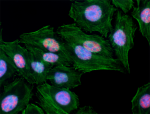
HeLa cells were fixed with 2% paraformaldehyde (PFA) for ten... 
Chromatin Immunoprecipitations (ChIP) were performed with cr... -
Alexa Fluor® 594 anti-RNA Polymerase II RPB1
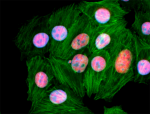
HeLa cells were fixed with 2% paraformaldehyde (PFA) for ten... -
Alexa Fluor® 647 anti-RNA Polymerase II RPB1
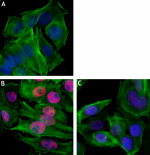
HeLa cells were fixed with 4% paraformaldehyde (PFA) for 10... -
Alexa Fluor® 488 anti-RNA Polymerase II RPB1
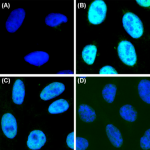
HeLa cells were fixed with 4% paraformaldehyde (PFA) for 15 ...
 Login / Register
Login / Register 









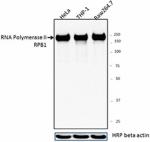



Follow Us